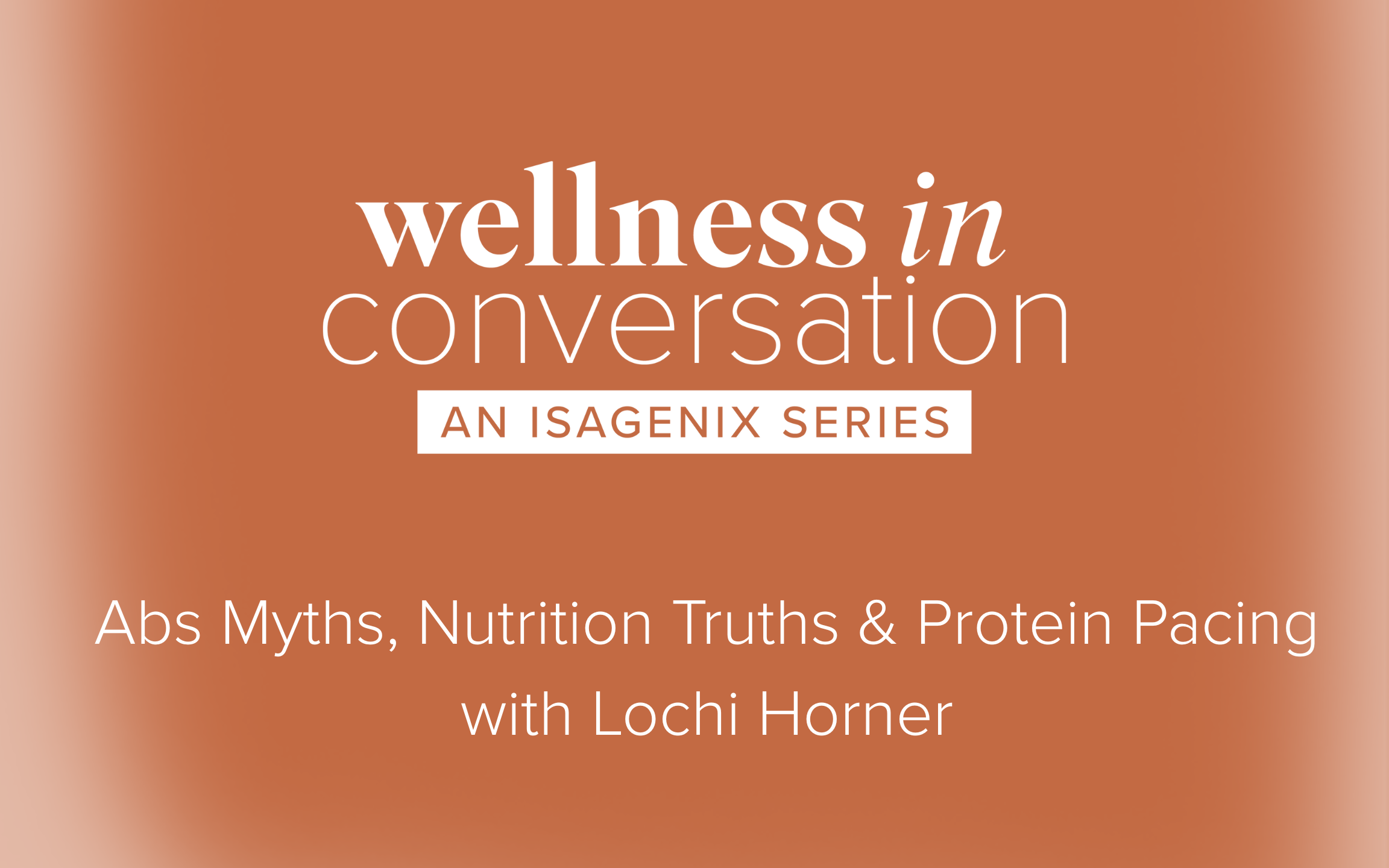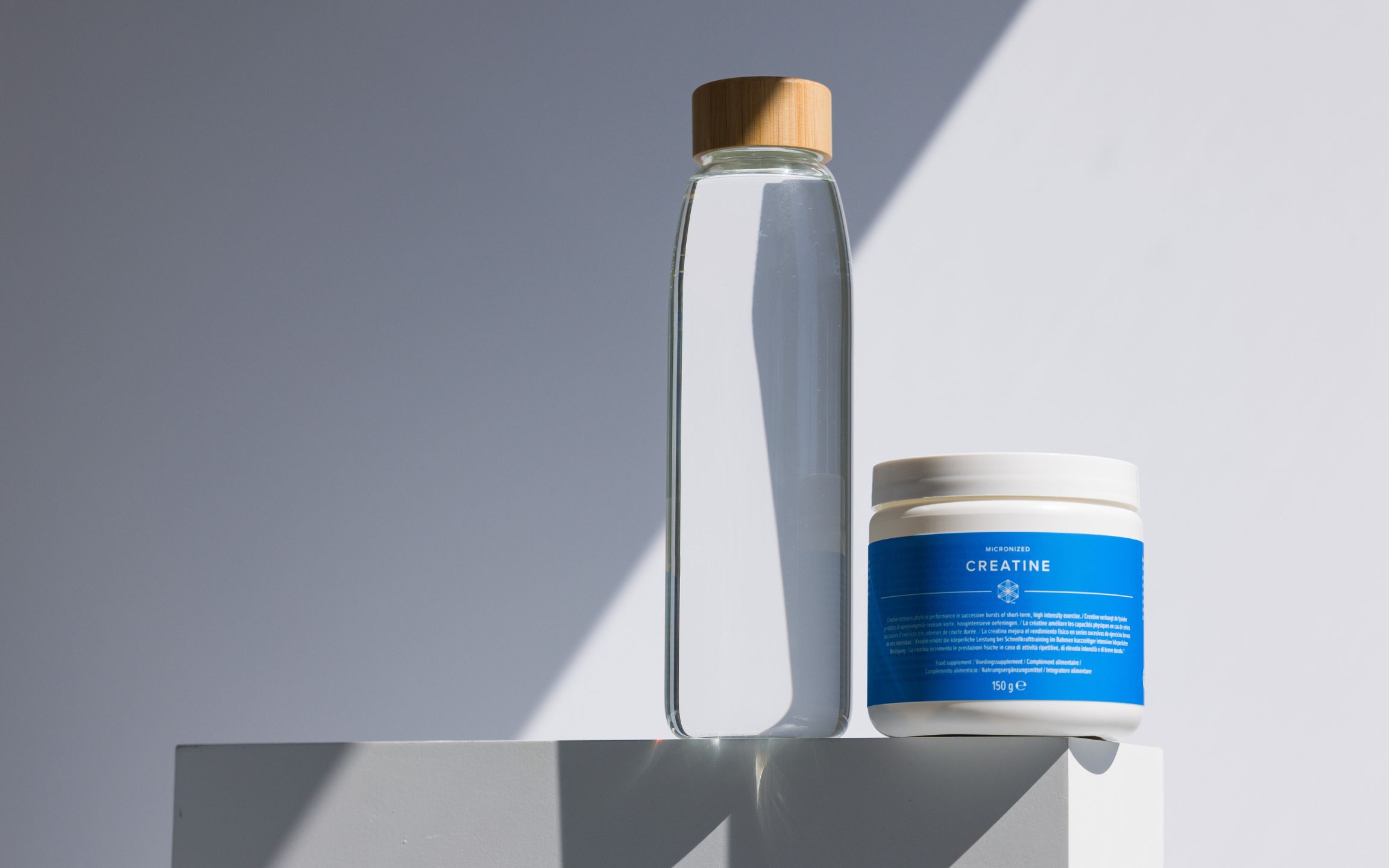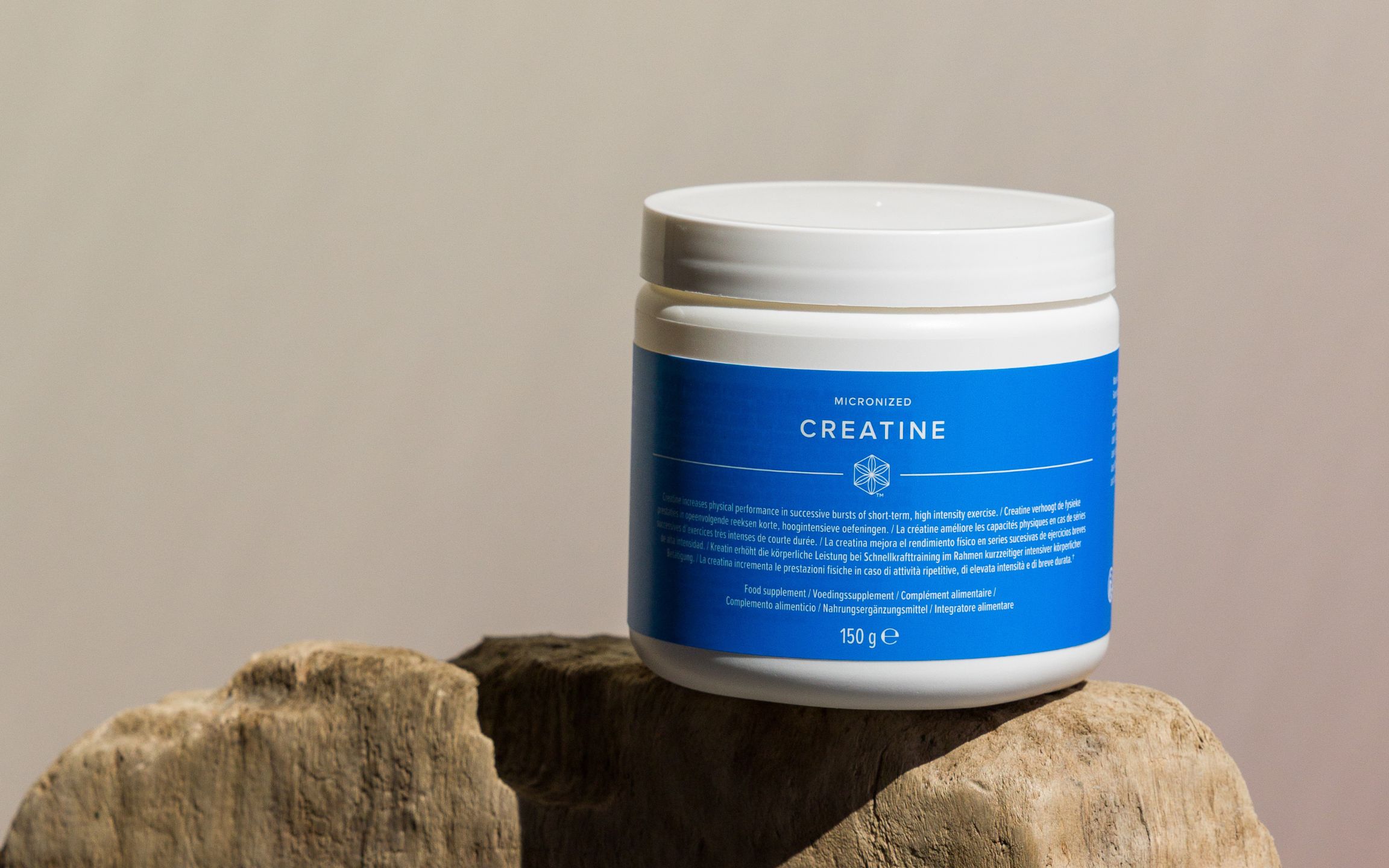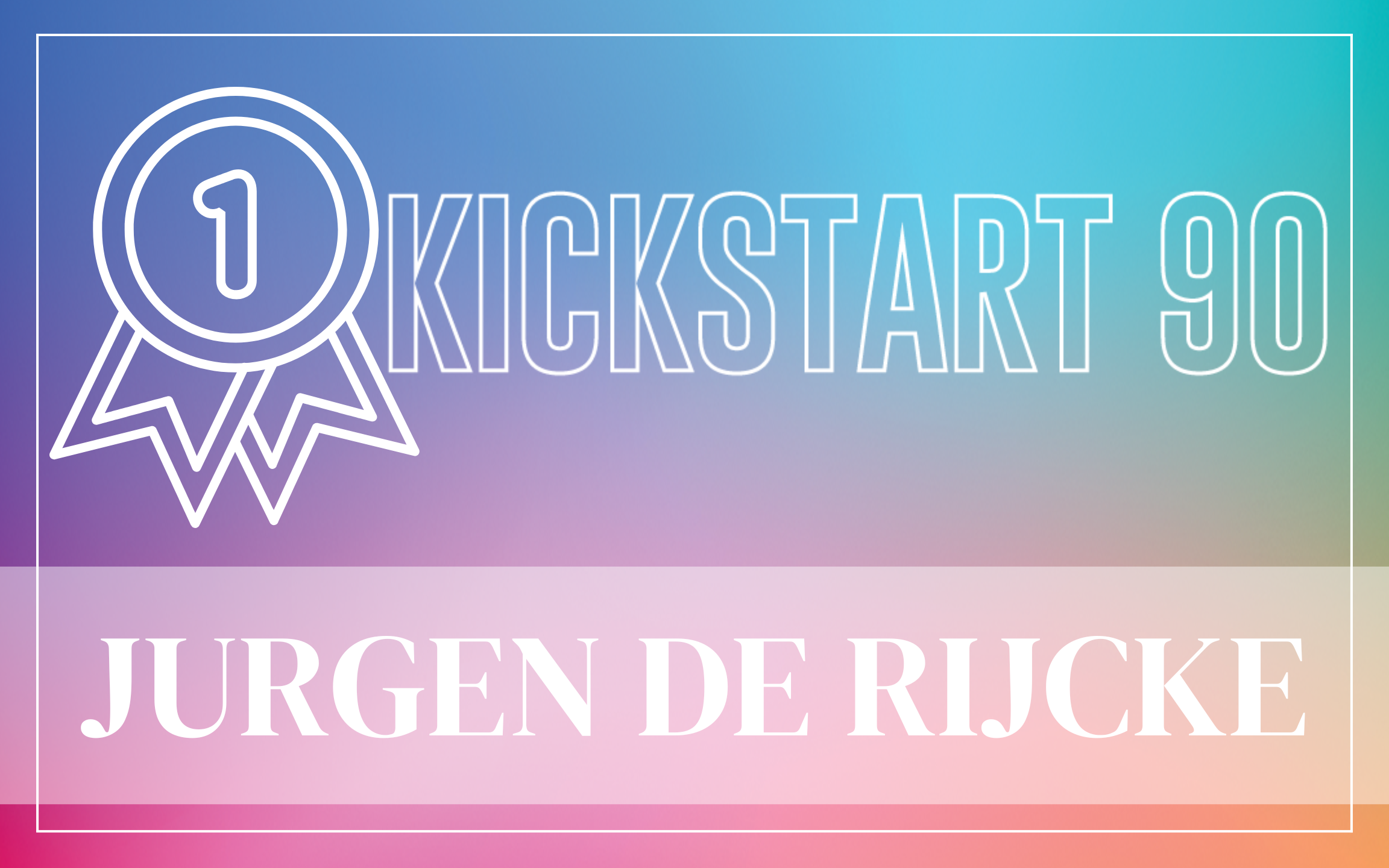Abs Myths, Nutrition Truths & Protein Pacing with Lochi Horner
August 27, 2025,
Victoria

Abs Myths, Nutrition Truths & Protein Pacing with Lochi Horner
In Episode 2 of Wellness in Conversation, host Mhari Oakes sat down with fitness coach and nutritionist Lochi Horner to unpack the truths (and bust the myths) around men’s health, abs training, protein, and supplements. From “doona-covered abs” to the science of protein pacing, this episode is full of practical wisdom that applies well beyond the gym.
Here’s the recap of the conversation and the key takeaways you can use today.
The Real Deal Behind Abs
We’ve all heard it before: crunches equal abs. But Lochi is quick to set the record straight. “It’s not true for men. It’s not true for women either,” he explained. The truth? Abs are made in the kitchen.
Abdominal muscles are relatively small, and while you can strengthen them, definition only shows when body fat is reduced. Lochi likens it to pulling back a doona (that’s a duvet or blanket, for our European readers) to reveal the sheets underneath, most of us are simply carrying that extra layer, hiding the six-pack.
That burning feeling in your core after sit-ups? It’s not fat cells exploding. It’s just the muscle working. For real results, smart nutrition paired with effective training is the only way forward.
While Lochi is careful not to dismiss any workout style – he loves them all – he cautions against expecting miracles from ab crunches alone. Instead, focus on combining consistent movement with proper nutrition. That’s where the magic happens.
And when it comes to nutrition, the conversation naturally shifts to protein, one of the most misunderstood areas of fitness.
What Is Protein Pacing?
Enter protein pacing, a term developed by Dr. Paul Arciero. Simply put, it’s about spreading protein intake evenly throughout the day instead of loading it all into one post-workout shake.
For decades, protein was seen primarily as a muscle-building aid. But research now shows its wider benefits: boosting metabolism, supporting fat burning, increasing satiety, and even promoting longevity.
“Think of every protein checkpoint in your day as an opportunity,” Lochi explained. “Each serving creates enzymes that pull fat from fat cells into your bloodstream to use as energy, while also helping you build and repair muscle.”
Choosing the Right Protein
Of course, not all protein is created equal. With so many products flooding the market, it’s easy to be misled by big claims and flashy packaging.
Lochi recommends starting with whey protein isolate, the gold standard for quality and absorption. Whey concentrate can still be effective, especially in blends, but lower-grade alternatives or products bulked with fillers won’t deliver the same results.
For those preferring plant-based options, the key is variety. No single plant source provides all essential amino acids, so look for blends that combine multiple sources to achieve a complete protein profile.
Beyond Protein: The Role of Supplements
The episode also dove into other supplements that can genuinely support performance and recovery when used wisely.
- Creatine: Once misunderstood, creatine is now the most researched sports supplement in the world. It supports muscle energy, improves recovery, and even shows promise as a brain booster. While some fear it causes bloating, Lochi explained that quality creatine simply increases water stored in muscles, a benefit, not a drawback.
- Caffeine: A proven endurance enhancer and fat-burning aid. Used in moderation, caffeine remains one of the safest and most effective performance tools.
- Collagen: Beyond skin health, collagen plays a vital role in strengthening joints, tendons, and ligaments. It can also speed recovery and reduce post-workout soreness, especially in those early weeks of training.
- Electrolytes: Often overlooked, electrolytes are essential for hydration and performance. Lochi highlighted the benefit of pairing them with hyaluronic acid for improved absorption without the sugar hit of traditional sports drinks.
Men’s Health in Focus: Hormones Matter
While women’s hormonal health has (rightfully) received more attention in recent years, men experience changes too. Lochi addressed andropause – a gradual decline in testosterone that can affect energy, recovery, mood, and motivation.
From the age of 30, testosterone naturally drops by about 1% each year. Lifestyle factors, however, account for up to 80% of this decline. Poor sleep, low activity, excess alcohol, and stress all play a role.
The good news? By lifting weights, prioritising protein, sleeping well, and making healthier choices, men can naturally support testosterone levels and regain vitality.
Capable vs. Conditioned: Lochi’s Top Advice
As the conversation wrapped up, Lochi left listeners with one powerful piece of advice: know the difference between being capable and being conditioned.
Many men return to training after a long break – whether from injury, busy careers, or family life – believing they can perform at the same level they once did. While the body may still be capable, without consistent conditioning, the risk of injury skyrockets. Easing back in with consistency and patience is the key. “The best is always yet to come,” Lochi reminded us, whether you’re 35 or 75, smart training and good nutrition can keep you thriving.
Episode 2 of Wellness in Conversation delivers a clear message: men’s health deserves attention, honesty, and science-backed solutions. Forget the quick fixes and gimmicks – the real results come from smart nutrition, consistent protein, quality supplements, and lifestyle choices that support long-term vitality.
For anyone serious about fitness, Lochi’s advice is clear: stop chasing shortcuts, start building habits, and remember that wellness is a journey, not a sprint.
Abs-mythes, Waarheid over voeding & proteïne-timing met Lochi Horner
In aflevering 2 van Wellness in Conversation ging host Mhari Oakes in gesprek met fitnesscoach en voedingsdeskundige Lochi Horner om de waarheid (en mythes) rond mannengezondheid, buikspieroefeningen, proteïne en supplementen te ontrafelen. Van “doona-covered abs” tot de wetenschap van proteïne-timing, deze aflevering zit vol praktische wijsheid die verder gaat dan de sportschool.
Hier is de recap van het gesprek en de belangrijkste inzichten die je vandaag al kunt gebruiken.
De waarheid achter buikspieren
We hebben het allemaal gehoord: crunches = buikspieren. Maar Lochi zet dit snel recht. “Het klopt niet voor mannen en het klopt ook niet voor vrouwen,legt hij uit. De waarheid? Buikspieren maak je in de keuken.
De buikspieren zijn relatief klein, en hoewel je ze kunt versterken, wordt definitie pas zichtbaar wanneer het lichaamsvet vermindert. Lochi vergelijkt het met het terugtrekken van een doona (een dekbed of deken) om de lakens eronder te onthullen – de meesten van ons dragen simpelweg die extra laag die het sixpack verbergt.
Dat brandende gevoel in je core na sit-ups? Dat zijn geen vetcellen die ‘ontploffen’, maar gewoon de spieren die werken. Voor echte resultaten is slimme voeding, gecombineerd met effectief trainen, de enige weg vooruit.
Hoewel Lochi geen trainingsstijl afwijst – Hij houdt van alle work outs– waarschuwt hij dat je geen wonderen mag verwachten van alleen crunches. Richt je liever op een combinatie van consistente beweging en goede voeding. Dáár gebeurt de magie.
En als het over voeding gaat, verschuift het gesprek vanzelf naar proteïne – een van de meest misbegrepen onderwerpen in fitness.
Wat is proteïne-timing?
Hier komt proteïne-timing, een term ontwikkeld door Dr. Paul Arciero. Simpel gezegd gaat het om het gelijkmatig verdelen van je eiwitinname gedurende de dag, in plaats van alles in één shake na je training.
Decennialang werd proteïne vooral gezien als een hulpmiddel voor spieropbouw. Maar onderzoek laat nu bredere voordelen zien: het verhoogt de stofwisseling, ondersteunt vetverbranding, verhoogt verzadiging en kan zelfs bijdragen aan een langer leven.
“Zie elk proteïne-moment op je dag als een kans,” legt Lochi uit. “Elke portie activeert enzymen die vet uit de vetcellen trekken en in je bloedbaan brengen om als energie te gebruiken, terwijl ze ook helpen spieren op te bouwen en te herstellen.”
De juiste proteïne kiezen
Natuurlijk is niet alle proteïne gelijk. Met zoveel producten op de markt is het makkelijk om misleid te worden door grote claims en opvallende verpakkingen.
Lochi raadt aan te beginnen met whey proteïne-isolaat, de gouden standaard voor kwaliteit en opname. Whey-concentraat kan ook effectief zijn, vooral in blends, maar goedkopere alternatieven of producten vol vulstoffen leveren niet dezelfde resultaten.
Voor wie plantaardige opties verkiest, is variatie de sleutel. Geen enkele plantaardige bron bevat alle essentiële aminozuren, dus zoek naar blends die meerdere bronnen combineren voor een compleet profiel.
Verder dan proteïne: de rol van supplementen
De aflevering ging ook in op andere supplementen die prestaties en herstel écht kunnen ondersteunen wanneer ze verstandig worden gebruikt.
• Creatine: Ooit verkeerd begrepen, maar nu het meest onderzochte sportsupplement ter wereld. Het ondersteunt spierenergie, verbetert herstel en toont zelfs potentieel als breinbooster. Sommigen vrezen een opgeblazen gevoel, maar Lochi legt uit dat kwaliteitscreatine gewoon meer water in de spieren opslaat – een voordeel, geen nadeel.
• Cafeïne: Een bewezen uithoudingsverbeteraar en vetverbrander. Met mate gebruikt blijft cafeïne een van de veiligste en meest effectieve hulpmiddelen.
• Collageen: Collageen gaat verder dan huidgezondheid en speelt een belangrijke rol bij het versterken van gewrichten, pezen en ligamenten. Het kan ook herstel versnellen en spierpijn verminderen, vooral in de eerste weken van training.
• Elektrolyten: Vaak over het hoofd gezien, maar essentieel voor hydratatie en prestaties. Lochi benadrukte het voordeel van combineren met hyaluronzuur voor betere opname, zonder de suikerpiek van traditionele sportdranken.
Mannen gezondheid in focus: hormonen doen ertoe
Hoewel de hormonale gezondheid van vrouwen de laatste jaren terecht meer aandacht heeft gekregen, ondergaan mannen ook veranderingen. Lochi sprak over andropauze – een geleidelijke daling van testosteron die energie, herstel, stemming en motivatie kan beïnvloeden.
Vanaf je 30ste daalt testosteron elk jaar met ongeveer 1%. Levensstijlfactoren verklaren echter tot 80% van deze daling. Slechte slaap, weinig beweging, teveel alcohol en stress spelen allemaal een rol.
Het goede nieuws? Door krachttraining, proteïne prioriteren, goed slapen en gezonde keuzes maken, kunnen mannen hun testosteronspiegel op natuurlijke wijze ondersteunen en vitaliteit terugwinnen.
Capabel vs. geconditioneerd: Lochi’s topadvies
Aan het einde van het gesprek gaf Lochi luisteraars één krachtig advies: ken het verschil tussen capabel zijn en geconditioneerd zijn.
Veel mannen keren terug naar training na een lange pauze – door blessure, werk of gezin – en denken dat ze nog op hetzelfde niveau kunnen presteren. Het lichaam kan misschien nog veel, maar zonder consistente training neemt het risico op blessures enorm toe. Rustig terug opbouwen met consistentie en geduld is de sleutel. “Het beste moet altijd nog komen,” herinnert Lochi ons. Of je nu 35 of 75 bent – slim trainen en goede voeding houden je fit en vitaal.
Aflevering 2 van Wellness in Conversation brengt een duidelijke boodschap: mannengezondheid verdient aandacht, eerlijkheid en wetenschappelijk onderbouwde oplossingen. Vergeet snelle oplossingen en trucs – de echte resultaten komen van slimme voeding, consequente eiwitinname, kwaliteitsvolle supplementen en levensstijlkeuzes die langdurige vitaliteit ondersteunen.
Voor iedereen die serieus met fitness bezig is, is Lochi’s advies helder: stop met shortcuts najagen, begin gewoontes op te bouwen, en onthoud dat wellness een reis is – geen sprint.
Mythes sur les abdos, vérités nutritionnelles & protein pacing avec Lochi Horner
Dans l’épisode 2 de Wellness in Conversation, l’animatrice Mhari Oakes s’est entretenue avec le coach sportif et nutritionniste Lochi Horner pour démystifier la santé masculine, l’entraînement des abdos, les protéines et les compléments alimentaires. Des “abdos sous la couette” à la science du protein pacing, cet épisode regorge de conseils pratiques qui vont bien au-delà de la salle de sport.
Voici le résumé de la conversation et les points clés que tu peux appliquer dès aujourd’hui.
La vérité derrière les abdos
On l’a tous entendu : faire des crunchs = avoir des abdos. Mais Lochi rectifie rapidement : « Ce n’est pas vrai pour les hommes. Et ce n’est pas vrai pour les femmes non plus », explique-t-il. La vérité ? Les abdos se font dans la cuisine.
Les muscles abdominaux sont relativement petits et, même si on peut les renforcer, leur définition n’apparaît que lorsque la masse grasse diminue. Lochi compare cela au fait de tirer une couette (ou couverture) pour révéler les draps en dessous – la plupart d’entre nous ont simplement cette couche supplémentaire qui cache le six-pack.
Cette sensation de brûlure dans le ventre après des sit-ups ? Ce ne sont pas des cellules graisseuses qui explosent, mais simplement le muscle qui travaille. Pour obtenir de vrais résultats, seule une nutrition intelligente combinée à un entraînement efficace fonctionne.
Même si Lochi ne dénigre aucun type d’entraînement – il les aime tous – il met en garde contre les attentes irréalistes liées aux crunchs seuls. Il vaut mieux se concentrer sur la combinaison d’un mouvement régulier et d’une bonne nutrition. C’est là que la magie opère.
Et quand il s’agit de nutrition, la discussion se tourne naturellement vers les protéines – l’un des domaines les plus mal compris de la remise en forme.
Qu’est-ce que le protein pacing ?
Le protein pacing, un terme développé par le Dr Paul Arciero, consiste tout simplement à répartir l’apport en protéines de manière équilibrée tout au long de la journée, au lieu de tout concentrer dans un seul shake après l’entraînement.
Pendant des décennies, les protéines étaient surtout vues comme un outil de construction musculaire. Mais la recherche démontre maintenant des bénéfices plus larges : stimuler le métabolisme, soutenir la combustion des graisses, augmenter la satiété et même favoriser la longévité.
« Considère chaque prise de protéines dans ta journée comme une opportunité », explique Lochi. « Chaque portion crée des enzymes qui mobilisent les graisses des cellules adipeuses vers ton sang pour les utiliser comme énergie, tout en aidant à construire et réparer le muscle. »
Choisir la bonne protéine
Bien sûr, toutes les protéines ne se valent pas. Avec autant de produits sur le marché, il est facile d’être trompé par des promesses alléchantes et des emballages tape-à-l’œil.
Lochi recommande de commencer par l’isolat de protéine de lactosérum, la référence en matière de qualité et d’absorption. Le concentré de pourquoi peut aussi être efficace, surtout dans les mélanges, mais les alternatives de moindre qualité ou enrichies en additifs n’apporteront pas les mêmes résultats.
Pour ceux qui préfèrent les options végétales, la clé est la variété. Aucune source végétale seule ne fournit tous les acides aminés essentiels, donc il faut chercher des mélanges combinant plusieurs sources pour obtenir un profil complet.
Au-delà des protéines : le rôle des compléments alimentaires
L’épisode a aussi abordé d’autres compléments qui peuvent réellement soutenir la performance et la récupération – lorsqu’ils sont utilisés avec sagesse.
• Créatine : Autrefois mal comprise, la créatine est aujourd’hui le complément sportif le plus étudié au monde. Elle soutient l’énergie musculaire, améliore la récupération et montre même un potentiel comme booster cérébral. Certains craignent qu’elle provoque des ballonnements, mais Lochi a expliqué qu’une créatine de qualité augmente simplement l’eau stockée dans les muscles – un avantage, pas un inconvénient.
• Caféine : Un booster d’endurance et brûleur de graisses éprouvé. Utilisée avec modération, la caféine reste l’un des outils de performance les plus sûrs et efficaces.
• Collagène : Au-delà de la santé de la peau, le collagène joue un rôle clé dans le renforcement des articulations, tendons et ligaments. Il peut aussi accélérer la récupération et réduire les courbatures après l’entraînement, surtout dans les premières semaines.
• Électrolytes : Souvent négligés, mais essentiels pour l’hydratation et la performance. Lochi a mis en avant l’intérêt de les associer à l’acide hyaluronique pour une meilleure absorption – sans le pic de sucre des boissons sportives classiques.
Santé masculine en lumière : les hormones comptent
Alors que la santé hormonale des femmes a (à juste titre) reçu plus d’attention ces dernières années, les hommes connaissent eux aussi des changements. Lochi a abordé l’andropause – un déclin progressif de la testostérone qui peut affecter l’énergie, la récupération, l’humeur et la motivation.
Dès l’âge de 30 ans, la testostérone baisse naturellement d’environ 1 % par an. Cependant, les facteurs liés au mode de vie expliquent jusqu’à 80 % de ce déclin. Mauvais sommeil, manque d’activité, excès d’alcool et stress y contribuent fortement.
La bonne nouvelle ? En pratiquant la musculation, en donnant la priorité aux protéines, en dormant bien et en faisant des choix plus sains, les hommes peuvent naturellement soutenir leur taux de testostérone et retrouver vitalité.
Capable vs. conditionné : le meilleur conseil de Lochi
En fin de conversation, Lochi a laissé aux auditeurs un conseil puissant : savoir faire la différence entre être capable et être conditionné.
Beaucoup d’hommes reprennent l’entraînement après une longue pause – qu’elle soit due à une blessure, au travail ou à la famille – en croyant pouvoir performer au même niveau qu’avant. Le corps peut encore en être capable, mais sans conditionnement régulier, le risque de blessure explose. Reprendre progressivement, avec constance et patience, est la clé. « Le meilleur est toujours à venir », a rappelé Lochi – que tu aies 35 ou 75 ans, un entraînement intelligent et une bonne nutrition peuvent te garder en forme et plein d’énergie.
L’épisode 2 de Wellness in Conversation envoie un message clair : la santé masculine mérite de l’attention, de l’honnêteté et des solutions fondées sur la science. Oublie les solutions rapides et les astuces – les vrais résultats viennent d’une nutrition intelligente, d’un apport régulier en protéines, de compléments de qualité et de choix de vie qui soutiennent une vitalité durable.
Pour quiconque prend le fitness au sérieux, le conseil de Lochi est limpide : arrête de courir après les raccourcis, commence à construire des habitudes et souviens-toi que le bien-être est un voyage, pas un sprint.




